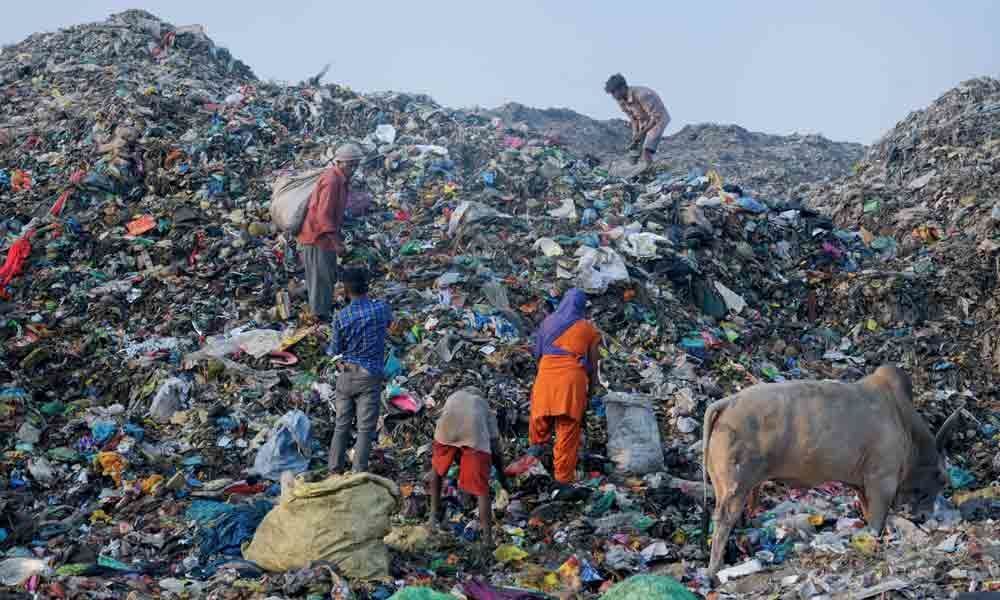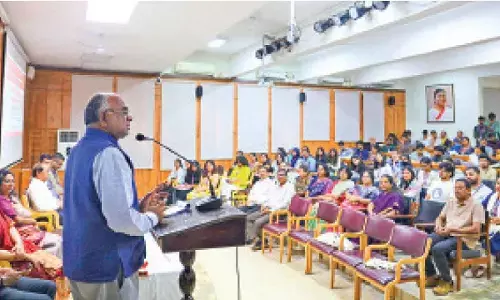Controlling air pollution essential for economic development
United Nations have been celebrating World Environmental Day (WED) on June 5th since 1974 to mark the Stockholm Conference on the Human Environment held in 1972 at Sweden.
United Nations have been celebrating World Environmental Day (WED) on June 5th since 1974 to mark the Stockholm Conference on the Human Environment held in 1972 at Sweden. Since then the various theme are adopted every year to create awareness on the burning environmental issues and to channelize the human efforts towards making difference in the way we treat our environment.
This year theme 'air pollution' underscore the fact that air is not just a physical entity but it is the determiner of life, elixir of evolution and saviour of the blue planet. Air is one among the two basic necessities of life along with water. Both of them have played decisive role in the evolution of life. Today so-called evolved life is adding pollutants to the air in unprecedented rate forgetting the fact that the 'end of pure-air is the end of life' on the earth.
The status of air quality is cause of concern in country like us where large masses are scrambling for the basic needs. Where, the topics like air pollution and climate change are perceived as intellectual debates limited to prime time shows instead of treating them as threat for the survival of humanity. There is a need to rejuvenate the human effort to fight the environmental quality in general and air quality in particular.
The extent of damage that air pollution can cause to the living being is less known to the world than its potential hazard. According to world health organization (WHO) fourteen out of the world most polluted twenty cities are in India. There are about seventy Lakhs air pollution related deaths globally every year. By 2030 respiratory disorder is the third largest killer in the world. The developing countries are worst hit by the effect of air pollution as 90% of pollution related deaths happen in the low- income group countries.
The different types of pollutants in air include toxic gases, carbon monoxide, chloral fluro carbon, sulphur, methane, suspended particles, silica, metal dust, carbon particles, fly ash, smoke, aerosols and smog all these pollutants reduce the air quality. When the Air Quality Index (AQI) - the statistical measure that tell us how good, bad or worse the air we breathe - crosses 100 the negative impact on the human health begins. When it reaches 500 it is considered to be hazardous. Central pollution control board's (CPCB) AQI observatories at 89 cities in India reveal that four cities are having very poor AQI with pollution score of more than 300. Seventeen cities are having poor AIQ with pollution score more than 200.
Lungs are the vital organs that become the first victim of air pollution. They have natural ability to overcome the limited pollutants in air, when AQI crosses 100, the lung physiology stars loosing it's ability to cope up with the gust of pollutants leading to lungs disorders. The respiratory diseases are soaring day by day. The range of pollution related health implications includes Chronic Respiratory Diseases, cardiovascular disorders, increased stress, lungs cancer, cell damage in respiratory system, allergy, ageing, reduces immunity, nausea, non- fatal heart attack, aggravated asthma, shortened breath etc. India is sacrificing nearly 8.5 per cent of its GDP due the health expenditure and labour lost owing to pollution related health effects.
While the government concentrates on the economic growth through plethora of pro development policies and schemes, the time has come to make all such developmental oriented policies environmental sensitive in letter and spirit. The environmental quality enforcing agencies at all state and national level has to gear up to avert the pollution catastrophe in the country before it causes irrevocable loss to the society. The corporate social responsibility (CSR) of business houses and public sector undertaking (PSU) has to be mandatorily grounded for measurable environmental conservation efforts.
It is paramount to control the air pollution to achieve the target for sustainable environment by 2030 as committed by the world leaders in Sustainable Development Goals. It is high time that India also has to take part in Global Alliance against Respiratory Diseases (GARD) established by WHO to steer the countries towards tackling the Chronic Respiratory Diseases (CRD) by taking country specific steps and comprehensive strategy to curtail the air pollution.
The developed countries have to intensify their efforts to fight climatic change. It is shocking to know that the top five countries contribute 64% of world Green House Gas (GHG) emission and the united state which contributes 27.51% GHG has not yet ratified the Kyoto protocol (An international treaty by the United Nations to reduce the emission of green house gasses by ratified country) while many developing countries have ratified it long back.
Multipronged approach of all the stake holders at individual level, institutional level and policy level is need of the hour to keep the air we breathe clean and healthy. One has to understand the fact that the environment is indebted from our future generations, everyone has duty to safely handover the pure air, pure water and livable environment to the future generation. While the parents care for providing the best material comfort to their children, they should also teach them the climatic conservation values. Use of emission causing equipments has to be minimized at household level. Tobacco smoking has to be aggressively curtailed by adopting de-addictive measures.
The community has to care for common property resources like climate, water and air. Cooperative positive approach to the climatic conservation have collective benefits in terms of pure air and water; less burden of Chronic Respiratory Diseases, reduced health expenditure and improved quality of life.
The elected bodies at different level required to set the visible targets to improve the environment quality. At urban local bodies and Panchayati level the targets has to be fixed for renewable energy production, emission reduction, afforestation, tobacco ban etc., this has motivating effect at grass root level to overcome the pollution. Making the work place pollution free reduces the occupational respiratory diseases among the industrial workers.
Of late the major political parties have started including the climate change aspects in their election campaign. BJP's poll manifestos indicates the target for renewable energy production; focus on 102 most polluted Indian cities to control air pollution and starting 'Green Bonus' for Himalayan states for forest conservation is a welcoming step. There are many tribal areas in the state of Andhra Pradesh, Odisha, Kerala, Tamil Nadu and Karnataka that needs Green Bonus for their forest conservation efforts. The urban forestry in Metropolitan cities equally needs incentive to sustain their efforts.
The awareness among the public on pollution effect is still short of required commitment. The enforcement agencies responsible for emission control and environmental discipline has to make their presence felt at all level. The environmental sensitive policies, involvement of all stakeholders to gear up the comprehensive efforts and incentivizing the successful agencies and industries for their effort helps to make a dent in keeping the air pollution under check. It is relevant to realize the fact that "life is in the air, but the air is polluted, need to purify it to sustain the life on the earth".


















